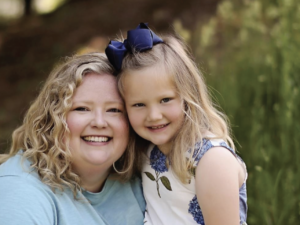By Harvey J. Sorum
Correspondent

Lauren Joyner, M.A. E, owner & director of Natural Steps Child Development Center and daughter. Submitted photos.
Tell us some of your background prior to starting the Natural Steps Child Development Center.
I have always worked in childcare. I started my own neighborhood babysitting service at 14 years old and worked in preschools all through high school and college. I have my bachelors of science degree in Human Development and Psychology and a Master of Art and education in school counseling. Both of my degrees are from Virginia Tech. I was a high school counselor in Christiansburg, VA for two years and an elementary school counselor in Crozet for seven years before opening Natural Steps.
Why did you start your new company – why, when, and where?
We opened in our current location in September of 2018 with five children and two teachers. It had always been a dream of mine, but I was never sure it would be a reality. After lots of discussion my husband and I decided to take a leap and go for it. We had lived in the area for a few years and the building had sat vacant for a while due to needing some serious renovations. We spent the whole summer of 2018 renovating the space. I took a year’s leave from my job with Albemarle County, just in case this whole plan didn’t work out. We leased our building with plans to purchase and we were able to buy our building in October of 2020.
My daughter and my community were the driving forces behind opening Natural Steps. I wanted a safe place for her to grow and learn, and I also wanted roots in our community. I wanted to create a neighborhood cornerstone that would meet the needs of our local families and build community.
Which is better – for a child to attend a day care center or stay at home during their early years?
One is not better than the other as a whole, but the choice is a very personal one that should be made to best fit the needs of the family. They both have their own benefits and drawbacks. For me, I am a very social person and so is my daughter. I enjoy having a career outside of the home and so does my husband, therefore childcare is very important to our family. We also live in a financial climate that often requires dual working families, which means our communities need quality childcare. I believe each family should make a decision that is the best fit for them.
Can a day care center help with the child’s transition to school or kindergarten?
Childcare gives young children many opportunities in their early years. The exposure to the social climate in childcare helps children learn a myriad of things. The relationships they build with their caregivers and peers strengthen their emotional and cognitive skills. When we think about children being “kindergarten ready” we want them to have the social and emotional skills to be successful. Cognitive skills cannot be strengthened without a solid social and emotional foundation. Childcare gives them the chance to explore new environments and experiences safely so when they enter kindergarten the experience of attending school is not completely new. While the setting and people might be different, children that attend childcare are already familiar with drop off and pick up routines, following directions from others, communication skills, working independently and in a group, and much more that sets them up for future academic success.
Childcare attendance requires having a strict and regular schedule during the day. Is this good or bad and why?
I wouldn’t say that it requires a strict schedule. I think it is important for parents to find a childcare schedule that works for them. We are open from 6:30 a.m. to 6 p.m., Monday through Friday. Some of our families need to use more hours than others. Some children come for a few days a week, or a few hours a day. The bulk of our curriculum happens between 9 a.m. and 12 p.m., so we do encourage parents to have their children here during those hours so they are able to participate.
As far as a schedule during the school day, flexibility is the name of the game. Each class has a daily schedule that accounts for meals, curriculum, outside time, and nap, but sometimes you have to adjust to best meet the needs of the group or school. Maybe the group is really into a craft so a teacher extends that activity for the day. Or maybe the group is very active and they need more outside time. Meals and naps do stay pretty regular, but outside of that we have to be flexible in order to best meet the needs of the class.
Does attending a day care center result with better academic results later on in life?
Overall, academic success is related to so many variables that change and shift over time. Success in school stems from young children having their needs met and safe exposure to new environments and experiences. This can happen for children in childcare settings and children that stay at home, if they are in the right environment. Having children in the right setting for them is what leads to the most success.
Staying at home during the early years is a one-on-one interaction with adults or parents. Does day care attendance help the child make friends and learn how to make themselves heard in a group?
Childcare definitely has many social benefits. Children that attend childcare begin building peer relationships in infancy. They have unlimited opportunities to work on communication skills and learn lessons on compromise, being part of a group, leadership skills, patience and much more. Many of our students graduate at four and five years old with friends they have had for several years. They also enter kindergarten with many familiar friends. While they are a part of a group here, they still have opportunities for one-on-one interactions with other adults and peers throughout the day.
Many of our graduates come back for our summer program and we see their friendships carry on or pick up right where they left off.
Are there health benefits for a child attending a day care center?
Ask any caregiver that has had a child in childcare and they will tell you their child, and likely themselves, have had their fair share of illness. In this setting we have strict and regular cleaning procedures, but young children are a super spreader of sorts. Everything goes in their mouth, and their handwashing skills are a work in progress. When a child first enters care, whether that is as an infant or a preschooler they will likely catch everything that passes through the school as they build up immunity. The good news is, after a year or two of consistent care they have very strong immune systems, and you see illnesses start to decline. I think teachers can agree that children who attend childcare miss far less days due to illness in kindergarten, than those who did not.
If a family is looking for a day care center, what should they look for during the search process?
This can look different for each family. Before they start their search, I encourage families to think about the core values they are looking for. They should identify the things they are willing to be flexible on and what their non-negotiables are. First families should look at general things like hours and days of operation, cost, location, and waitlists to see if it works for their family’s needs. Once they have a list of schools that could work, they might want to consider things like time spent outside, discipline policies, curriculum, teacher turnover, extracurricular activities, etc. Overall, families are looking for somewhere their child is safe and loved, that is within their budget. Families shouldn’t be afraid to ask as many questions as they need to get the information needed to make the right decision. I also encourage asking if you can spend some time in the classrooms. We want our prospective families to be 100 percent sure about their decision before they make an enrollment commitment.




